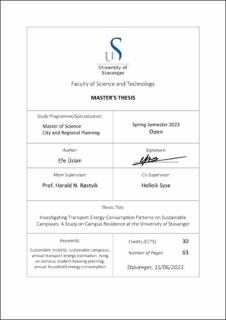| dc.description.abstract | This research investigates the energy consumption patterns of the students at the University of Stavanger, particularly that of the students residing in student housing facilities (SIS). An energy estimation methodology was developed and applied to analyse the annual consumption of students with a focus on transportation energy. Household energy consumption was also designated as a supplementary sector to achieve comparability with the results of the transport sector, revealing significantly higher yearly figures in households especially due to the cold Norwegian climate. Hereby, the study emphasizes the importance of transport energy which constitutes a substantial amount of a university student’s energy footprint.
The study questions whether on-campus residency leads to lower energy consumption in transportation and carbon emissions, with a notion of promoting active transportation methods and enhanced campus amenities. It points out the potential of an expected shift to an electric bus fleet from the diesel equivalents and the energy reduction caused by the collective use of private vehicles. Furthermore, the research explores the relationship between housing density and energy consumption loads for transport and household sectors.
The findings demonstrate that densely built multi-dwelling housing facilities lead to lower household energy load per capita, but higher transport energy load per unit area, and the proximity to the campus results in lower annual transport energy consumption. Therefore, a combination of dense housing facilities and robust transportation strategies are the key factors to reduce energy demand. Although the results are context-specific to Norway, the research provides a replicable methodological approach for higher education campuses to reduce carbon emissions and energy consumption, while emphasizing the need for a holistic view of energy consumption, integrating individual behaviour, and comprehensive planning of sustainable transportation development. | |
